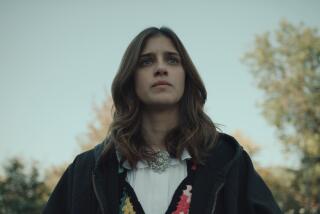MOVIE REVIEW : Poignant ‘Lonely Woman Seeks Companion’
- Share via
Irina Kupchenko, in the moving Soviet film “Lonely Woman Seeks Life Companion” (at the Monica 4-Plex) has a great movie face; layers and layers of emotion seem to be rippling underneath. In “Lonely Woman,” her character at first seems drab, her expression drained and drawn. But it’s a mask. Kupchenko can make herself plain, then make that plainness radiant.
Here, she’s playing seamstress Klavdia, an embittered woman of 43, unmarried, living alone, driven to posting little notices around Moscow--”Lonely woman seeks life companion”--in order to meet men. But Kupchenko, without sentimentality or trickery, shows what makes Klavdia special. Like all great actors, she unites us with her character, lets us feel and see with her.
The plainness is part of the story’s theme; it’s about two people, equally alone, who briefly infiltrate each other lives. It’s a poignant comedy of social barriers, with an air of wistful melancholy--though, in translation, the pathos comes through more strongly than the humor.
In the film, Klavdia’s plaintive ad brings an unlikely respondent: an alcoholic ex-circus acrobat named Valentin (Alexander Zbruyev), a homeless man on a disability pension. Despite his winsome smile and charmingly straightforward manner, their first encounter almost ends in debacle. He tries to get money from her purse; she bops him on the head and throws him out. Then she relents. Beneath her brusque, weary surface--a woman who’s known too many wayward men, been stung too many times--is a flow of tenderness and sympathy. Valentin seizes on this, returns to her again and again.
The movie is a haunting little vignette. Shot in 1986, near the dawn of glasnost and perestroika, it reveals ideas and feelings that, to the West, later seemed to erupt from nowhere: discontent, malaise, oppression, a feeling that life under the old Communist rule was purposeless, empty and sad.
This isn’t the idyllic Moscow of Stalinist cinema, of brave workers striving for a better tomorrow. Instead, director Viacheslav Krishtofovich shows us a gray city, lines of men at the bars and liquor stores: real, unstaged views of Moscow, shot with a hidden camera. The blighted “romance” is clearly part of a larger social malaise, but the movie doesn’t stress this.
If a story like this had been made in an American studio during the ‘80s, it probably would have reflected the same selfish mind-set as Klavdia’s snob-boss, who--in an allegedly classless society--castigates her for consorting with riff-raff. But this movie, with its low-key realism, looks at life more evenly.
The obvious predecessors for Krishtofovich and writer Victor Merezhko are Delbert Mann, Paddy Chayefsky and movies like the 1955 “Marty.” Like Mann, Krishtofovich is a first-time director from TV whose visual technique seem a little dull, almost styleless. Yet, at its best, “Lonely Woman” unrolls so naturally, so easily, it seems to be eavesdropping on life itself. There are some pat and preachy nudges in the writing but Krishtofovich has the right calm, compassionate tone throughout.
As Valentin, Zbruyev is a fine homeless beau. His dialect shifts and inflated comic rhetoric aren’t quite translatable, but his face is wonderfully hangdog. And Kupchenko, who won the best-actress award at the Montreal Festival with this film, is brilliant. She became a star early in life, in Andrei Konchalovsky’s 1969 adaptation of Turgenev’s “Nest of Gentry”; by now, her playing is effortless.
Like Gerard Depardieu or Marlon Brando, she seems to be inhabiting her movies rather than acting in them, living out stories before the camera. And this story--of lonely people in a society that tries to ignore its “losers”--strikes chords far from Russia. Just like Klavdia’s ad, “Lonely Woman Seeks Life Companion” (Times-rated Family, despite mature themes), is a plea for understanding, for the connections that make life bearable. Melancholy lies under its terseness, love under its simple lines.
More to Read
Only good movies
Get the Indie Focus newsletter, Mark Olsen's weekly guide to the world of cinema.
You may occasionally receive promotional content from the Los Angeles Times.










